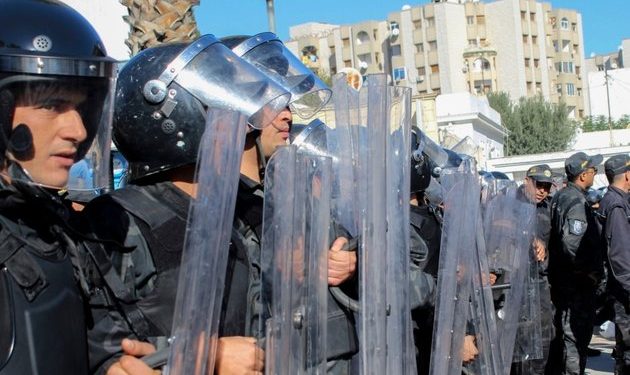TUNIS, TUNISIA – A few days after Tunisia’s president froze parliament and took on sweeping powers in July, a dozen men in unmarked vehicles and civilian clothes barged into politician Yassine Ayari’s family home overnight and took him away in his pajamas.
‘These men weren’t wearing uniforms and they didn’t have a warrant,’ Ayari told The Associated Press. ‘It was violent. My 4-year-old son still has nightmares about it.’
A 40-year-old computer engineer-turned-corruption fighter, Ayari will stand trial again in a military court on Monday, accused of insulting the presidency and defaming the army. It is the latest in a series of trials that shine a light on Tunisia’s use of military courts to push through convictions against civilians. Rights groups say the practice has accelerated since President Kais Saied’s seizure of power in July and warn that its use further threatens hard-won freedoms amid Tunisia’s democratic backsliding.
The charges Ayari faces relate to Facebook posts in which he criticized Saied, calling him a ‘pharaoh’ and his measures a ‘military coup.’ Ayari intends to remain silent in court to protest the whole judicial process, according to his lawyer, Malek Ben Amor.
Amnesty International is warning of an ‘alarming increase’ in Tunisian military courts targeting civilians. In the past three months, it says, 10 civilians have been investigated or prosecuted by military tribunals, while four civilians are facing trial for criticizing the president.
That’s especially worrying because Tunisia was long considered the only democratic success story to emerge from the Arab Spring uprisings a decade ago and was long seen as a model for the region.
Most countries in the Middle East are now ruled by authoritarian governments, where military courts – ostensibly tasked with targeting threats to stability – are a tool for crushing dissent. Jordan and Egypt are among countries with a military court system, while Israel has established a separate military court system for Palestinians in the occupied West Bank.
An independent member of parliament, Ayari is known for criticizing Tunisia’s army and government and for his corruption investigations. One led to the resignation of former Prime Minister Elyes Fakhfakh in 2020 after Ayari published documents proving the leader had a conflict of interest.
Ayari says he has been tried by a military tribunal nine times, leading to three sentences.
‘There is no law in military courts, no independence,’ he said.
He is among the Tunisian legislators whose employment status was suspended after Saied dismissed the government and froze parliament on July 25.
‘I have to figure out how I’m going to pay my bills. Now I’m asking my wife for 10 dinars ($3.50) to even go out and buy a pack of cigarettes,’ Ayari said.
The Tunisian president’s surprise measures followed nationwide anti-government protests and rising frustrations with the North African nation’s political elite, who are widely perceived as corrupt and inefficient in the face of Tunisia’s growing coronavirus crisis and its economic and political woes.
Saied also revoked the immunity of lawmakers like Ayari, who was swiftly arrested. He was jailed in July for a 2018 charge of defaming the army in a Facebook post and sentenced to two months in prison.
Habib Bourguiba, Tunisia’s leader after independence from French rule, established a military justice code that gave military courts the right to try civilians for crimes that included insulting ‘the flag or the army.’ Efforts to reform the military justice code since the 2011 revolution have stalled.
‘Military courts are still under the undue control of the executive branch, as the president of the republic has exclusive control over the appointment of judges and prosecutors in these courts,’ read a recent Amnesty report.
Saied’s critics say the army has become a political tool since July, noting that troops secured parliament when the government was dismissed, drawing comparisons with Egypt’s military coup in 2013. Tunisia’s army enjoys a high level of popularity and has traditionally played an apolitical role in the nation’s affairs.
The president ordered the army to take charge of the nation’s COVID-19 vaccination campaign, using their ‘image of strength and efficiency’ to bolster his standing, political analyst Sharan Grewal said.
Saied is also ‘trying to get quick wins by using the military courts, which are in theory more reliable in the prosecution of certain members of parliament,’ he said.
In September, Saied partially suspended the country’s 2014 constitution, giving himself the power to rule by decree. Saied has also taken aim at the country’s judiciary, whose ranks he claims are filled with corrupt judges who must ‘be cleansed.’ Observers have called Tunisia’s political crisis a step back in the country’s democratic transition.
During his recent sentence, Ayari says he was filmed with video cameras in his cell and denied access to correspondence. Despite acute stomach ulcers, guards gave him cold food – contrary to medical advice. In protest, Ayari went on a two-week hunger strike.
Representatives of Tunisia’s National Body for the Prevention of Torture shared a report with the AP that corroborates some of Ayari’s claims, including rights violations and evidence of ‘humiliating and degrading’ treatment that posed a risk to his health.
The Ministry of Justice didn’t respond to the AP’s requests for comment.
Ayari is now preparing for a possible new stint behind bars.
‘I’m trying to eat as much as possible and sleep, because those two things are difficult to do in prison,’ Ayari says. ‘This whole thing is not easy for my children. It is bad for their education: How are they supposed to tell the difference between right and wrong, justice and injustice, when they see their father get taken to prison?’






